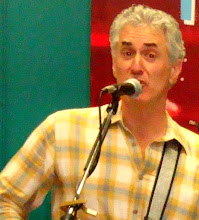 It was just like Christmas when AM Radio broadcast it's first piece of music. Well, actually, it really was. Christmas Eve, 1906 was the first time that music was broadcast on the radio.
It was just like Christmas when AM Radio broadcast it's first piece of music. Well, actually, it really was. Christmas Eve, 1906 was the first time that music was broadcast on the radio.Reginald Fessenden was a brilliant Canadian inventor who got his start working for Thomas Edison and through his life received hundreds of patents in radio, sonar and television. After demonstration of a new alternator-transmitter at his transmitting station in Brant Rock, Massachusetts, a few days earlier, "Fezzie" (as he was called) broadcast the first radio show at 9pm on December 24th, 1906.

Fezzie laid down some smooth patter (unknown if he sounded like Wolfman Jack) and then had to read some bible verses after his wife and secretary got mic fright which resulted in the first case of "dead air" on the radio. Besides
playing Edison's cylindar recording of Handel's "Largo", Fezzie pulled out his violin, and, in the first "live on the radio" performance played, "O Holy Night".
Reportedly, the main audience for this first ever radio show was a number of shipboard radio operators along the Atlantic Coast. This landmark broadcast was barely noted and soon forgotten. Ouch! I guess Fezzie wasn't much of a violinist. Or perhaps his over-use of sound effects and gimmicks such as slide-whistle, bike horn and his incessant, "What's up, New England?!", was a listener turn off. In any event, I can't think of a better tu
 ne than "O Holy Night" to be the first song ever performed live on the radio.
ne than "O Holy Night" to be the first song ever performed live on the radio."O Holy Night" is a righteous tune that I previously expressed my admiration for and wrote about (see December 24th, 2008 post). It was composed by Adolphe Adam in 1847 to accompany the French poem, "Minuit, Chretiens" which I think might mean, "One Minute, You Cretins" or "Midnight, Christians". I'm not really sure as I don't read or speak French.
Today is Adolphe Adam's birthday and I really think the guys deserves a salute. Besides writing one of the most beautiful melodies in the world, he's well-known for his Operas (e.g. "Si J'Etais Roi), and (besides, "O Holy Night"), most notably his ballet, "Giselle".

Young Adolphe preferred to improvise music rather that study seriously. He studied organ and harmonium at the Paris Conservatoire. After playing triangle in the Conservatoir Orchestra and not winning the Grand Prix de Rome, his father discouraged his choice of a music career. Many students since have realized the lack of potential stardom from playing triangle. However, Adolphe got the last laugh after making a name for himself in the music world as a composer. It's a lesson to be learned that proficient technical skills on an instrument won't neccessarily put money in your pocket. Adolphe learned that you've got to write a hit.
I wonder if he maintained his own publishing?







